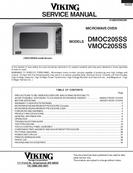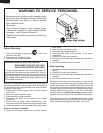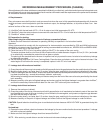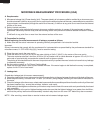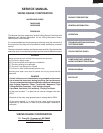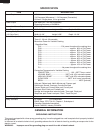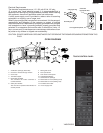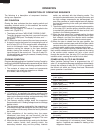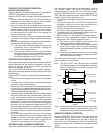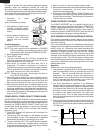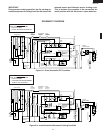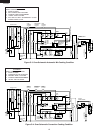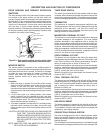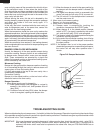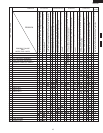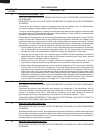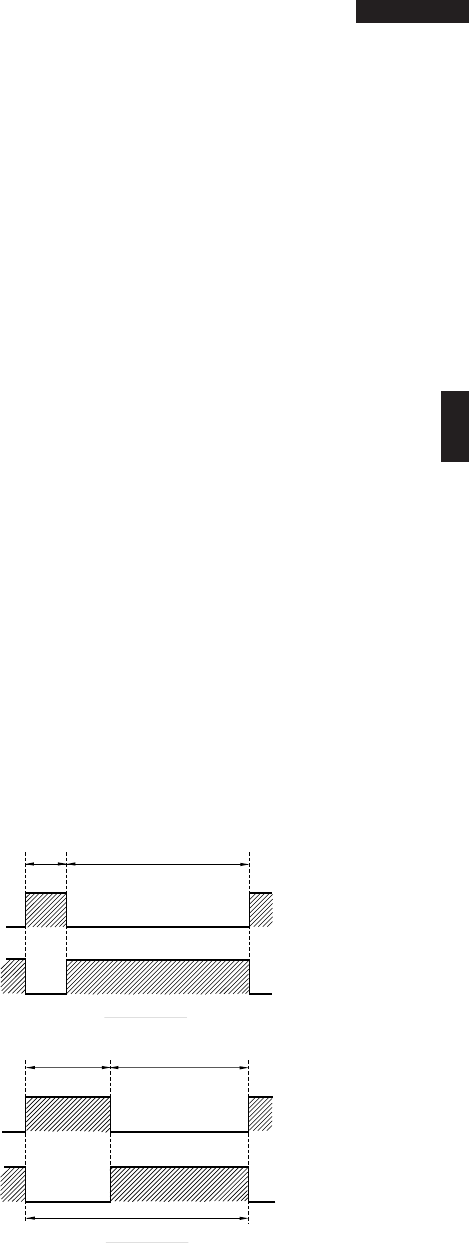
9
DMOC205SS
VMOC205SS
CONVECTION COOKING CONDITION
PREHEATING CONDITION
Program desired convection temperature by touching the
CONVECTION pad and the Temperature pad.
When the START pad is touched, the following operations
occur:
1. The coil of shut-off relays (RY1, RY3,RY5 and RY6) are
energized, the oven lamp, cooling fan motor, turntable
motor and convection motor are turned on.
2. The coil of relay (RY4) is energized by the control unit.
The damper is moved to the closed position, opening the
damper switch contacts. The opening of the damper
switch contacts sends a signal to the LSI on the control
unit de-energizing the relay (RY4) and opening the
circuit to the damper motor.
3. The coil of heater relay (RY3) is energized by the control
unit and the main supply voltage is applied to the heating
element.
4. When the oven temperature reaches the selected preheat
temperature, the following operations occur:
4-1 The heater relay is de-energized by the control unit
temperature circuit and thermistor, opening the
circuit to the heating element.
4-2. The oven will continue to function for 30 minutes,
turning the heater on and off, as needed to maintain
the selected preheat temperature. The oven will
shut-down completely after 30 minutes
CONVECTION COOKING CONDITION
When the preheat temperature is reached, a beep signal will
sound indicating that the holding temperature has been
reached in the oven cavity. Open the door and place the
food to be cooked in the oven.
Touch the CONVEC pad first and then touch the Tempera-
ture pad. And program desired cooking time by touching the
Number pads.
When the START pad is touched, the following operations
occur:
1. The numbers on the digital read-out start to count down
to zero.
2. The oven lamp, turntable motor, cooling fan motor and
convection motor are energized.
3. Heater relay (RY3) is energized (if the cavity temperature
is lower than the selected temperature) and the main
supply voltage is applied to the heating element to return
to the selected cooking temperature.
4. Upon completion of the cooking time, the audible signal
will sound, and oven lamp, turntable motor, cooling fan
motor and convection motor are de-energized. At the
end of the convection cycle, if the cavity air temperature
is above 275
ο
F, the circuit to RY6 will be maintained (by
the thermistor circuit) to continue operation of the cooling
fan motor until the temperature drops below 245
ο
F, at
which time the relay will be de-energized, turning off the
fan motor. Relay RY5 will however, open as soon as the
convection cycle has ended, turning off the convection
fan motor.
5. At the end of the convection cook cycle, shut-off relay
(RY4) is energized turning on the damper motor. The
damper is returned to the open position, closing the
damper switch contacts which send a signal to the
control unit, de-energizing shut-off relay (RY4).
AUTOMATIC MIX COOKING CONDITION
Touch the HIGH MIX/ROAST or the LOW MIX/BAKE pad
first. And then program desired cooking time by touching
the Number pads. The LOW MIX/BAKE pad is
preprogrammed for 350
ο
F with 10% microwave power,
while the HIGH MIX/ROAST pad is preprogrammed for
300
ο
F with 30% microwave power. When the START pad is
touched, the following operations occur:
1. The numbers on the digital read-out start to count down
to zero.
2. The shut-off relays (RY1,RY2,RY3,RY5 and RY6) are
energized, turning on the oven lamp, turntable motor,
cooling fan motor and convection fan motor.
3. The shut-off relay (RY4) is energized.
The damper door is closed from the open position.
4. The heater relay (RY3) is energized, applying the main
supply voltage to the heating element.
5. Now, the oven is in the convection cooking condition.
6. When the oven temperature reaches the selected
temperature, the following operations occur:
6-1. The power supply voltage is alternated to the
heating element and power transformer.
6-2. The heating element operates through the heater
relay (RY3) contacts and the power transformer
operates through the primary interlock relay (RY2)
contacts.
6-3. These are operated by the control unit to supply
alternately within a 32 second time base, convection
heat and microwave energy.
The relationship between the convection and microwave
power operations are as follows.
Note: The ON and OFF time ratio does not correspond
with the percentage of microwave power, because
approx. 2 seconds are needed for heating of the
magnetron filament.
Note: During alternate Microwave/Convection operation,
the convection heater is energized only if the cavity
temperature drops below the set temperature.
SENSOR COOKING CONDITION
Using the SENSOR COOK function, the foods are cooked
without figuring time, power level or quantity. When the
oven senses enough steam from the food, it relays the
information to its microprocessor which will calculate the
remaining cooking time and power level needed for best
results.
When the food is cooked, water vapor is developed.
12 SEC. 20 SEC.
32 SEC.
LOW MIX
BAKE
HIGH MIX
ROAST
MICROWAVE POWER
= APPROX. 30%
CONVECTION
TEMPERATUE
= 300°F
MICROWAVE POWER
= APPROX. 10%
CONVECTION
TEMPERATUE
= 350°F (180°C)
26 SEC.6 SEC.
ON
ON
OFF
OFF
OFF
ON
(MICRO.)
(CONVEC.)
(MICRO.)
(CONVEC.)













